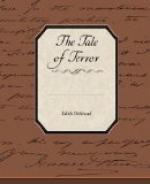“All that is indispensable for the enjoyment of the milder feeling of supernatural awe is that you should be susceptible of the slight shuddering which creeps over you when you hear a tale of terror—that well-vouched tale which the narrator, having first expressed his general disbelief of all such legendary lore, selects and produces, as having something in it which he has been always obliged to give up as inexplicable. Another symptom is a momentary hesitation to look round you, when the interest of the narrative is at the highest; and the third, a desire to avoid looking into a mirror, when you are alone, in your chamber, for the evening."[115]
In her story “Aunt Margaret” describes how, in a magic mirror belonging to Dr. Baptista Damiotti, Lady Bothwell and her sister Lady Forester see the wedding ceremony of Sir Philip Forester and a young girl in a foreign city interrupted by Lady Forester’s brother, who is slain in the duel that ensues. Scott regarded these two stories as trifles designed to while away a leisure hour. On Wandering Willie’s Tale—a masterpiece of supernatural terror—he bestowed unusual care. The ill fa’urd, fearsome couple—Sir Robert with his face “gash and ghastly as Satan’s,” and “Major Weir,” the jackanape, in his red-laced coat and wig—Steenie’s eerie encounter with the “stranger” on horseback, the ribald crew of feasters in the hall are described so faithfully and in such vivid phrases that it is no wonder Willie should remark at one point of the story: “I almost think I was there mysell, though I couldna be born at the same time.” The power of the tale, which fascinates us from beginning to end and which can be read again and again with renewed pleasure, depends partly on Wandering Willie’s gifts as a narrator, partly on the emotions that stir him as he talks. With unconscious art, he always uses the right word in his descriptions, and chooses those details that help us to fix the rapidly changing imagery of his scenes; and he reproduces exactly the natural dialogue of the speakers. He begins in a tone of calm, unhurried narration, with only a hint of fear in his voice, but, at the death of Sir Robert,




